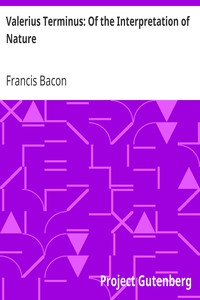Valerius Terminus: Of the Interpretation of Nature by Francis Bacon
"Valerius Terminus: Of the Interpretation of Nature" by Francis Bacon is a philosophical treatise written in the early 17th century. The text serves as a foundational work where Bacon outlines his ideas on scientific inquiry and the interpretation of Nature, delving into how knowledge should be approached and utilized. It proposes that true understanding of the natural world requires a methodology that aligns with both empirical observation and theological principles. The opening
of the text presents a prefatory overview that elaborates on its structure and purpose. It introduces the idea that knowledge is limited and should be regarded with caution, primarily emphasizing the importance of religion in guiding scientific pursuit. Bacon discusses historical figures such as Moses and Solomon to illustrate legitimate searches for knowledge grounded in nature. He criticizes man’s inclination to overreach into divine secrets, warning against the consequences of such ambition, which ultimately leads to downfall. The text sets the stage for a critical examination of existing knowledge and serves as a call for a more disciplined, inductive approach to scientific thought. (This is an automatically generated summary.)
Read or download for free
| How to read | Url | Size | |||
|---|---|---|---|---|---|
| Read now! | https://www.gutenberg.org/ebooks/3290.html.images | 144 kB | |||
| EPUB3 (E-readers incl. Send-to-Kindle) | https://www.gutenberg.org/ebooks/3290.epub3.images | 153 kB | |||
| EPUB (older E-readers) | https://www.gutenberg.org/ebooks/3290.epub.images | 152 kB | |||
| EPUB (no images, older E-readers) | https://www.gutenberg.org/ebooks/3290.epub.noimages | 136 kB | |||
| Kindle | https://www.gutenberg.org/ebooks/3290.kf8.images | 296 kB | |||
| older Kindles | https://www.gutenberg.org/ebooks/3290.kindle.images | 275 kB | |||
| Plain Text UTF-8 | https://www.gutenberg.org/ebooks/3290.txt.utf-8 | 306 kB | |||
| Download HTML (zip) | https://www.gutenberg.org/cache/epub/3290/pg3290-h.zip | 130 kB | |||
| There may be more files related to this item. | |||||
Similar Books
About this eBook
| Author | Bacon, Francis, 1561-1626 |
|---|---|
| Annotator | Ellis, Robert Leslie, 1817-1859 |
| Title | Valerius Terminus: Of the Interpretation of Nature |
| Credits | Mike Pullen and David Widger |
| Reading Level | Reading ease score: 51.2 (10th to 12th grade). Somewhat difficult to read. |
| Language | English |
| LoC Class | B: Philosophy, Psychology, Religion |
| Subject | Science -- Methodology |
| Category | Text |
| EBook-No. | 3290 |
| Release Date | Jun 1, 2002 |
| Most Recently Updated | May 18, 2023 |
| Copyright Status | Public domain in the USA. |
| Downloads | 403 downloads in the last 30 days. |
| Project Gutenberg eBooks are always free! | |

